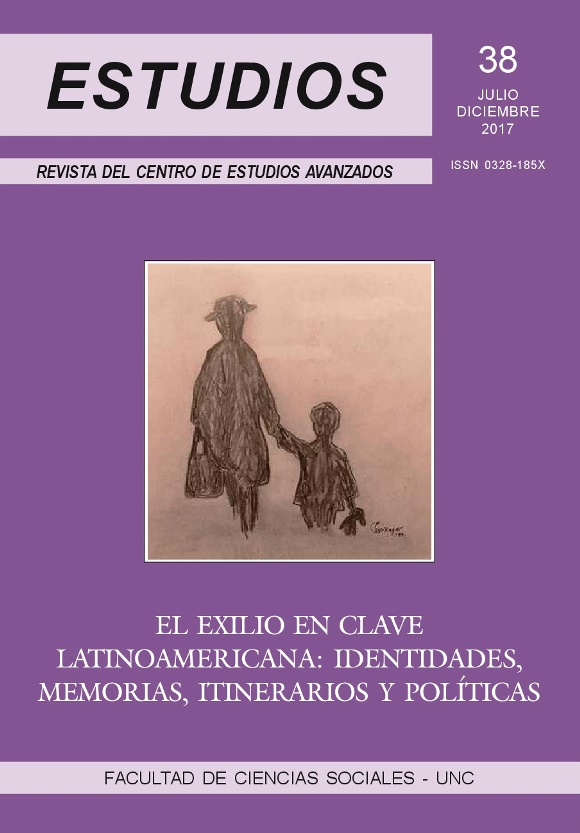The Colombian Exile in Spain: Peace Dialogues, a Before and an Afte
DOI:
https://doi.org/10.31050/re.v0i38.19131Keywords:
Exile, Colombia, Political participation, Peace, SpainAbstract
Despite having been the scene of a long internal conflict, Colombia has been perceived as a clearly democratic country since it has not been involved in military governments like those taking place in Latin America in a good part of the 20th century. However, the intervention in the political arena has implied high risks for a wide range of sectors of the population. This is specially evident with those from the political and social left, who have been the object of systematic pursuit, obliging them to take the road to exile.
This paper starts with a short presentation of the Colombian exile as a study case. Secondly, it clarifies the relation between the concepts of exile and forced migrations. Afterwards, it deals with the difficulties to categorise the Colombians' forced migrations within the armed conflict context. The following section refers to the special programmes of protection for Colombians in Spain and it analyses the political militancy and participation characteristics of the exilees from this country left. The last part looks into the new participatory practices developed within the Peace Talks atmosphere, paying attention to the resources used to include their demands in the Peace Process. Finally, the essay suggests some possible tensions and concerns which can emerge in the future, as a collective, and outlines new research perspectives.
References
ACNUR, (1954),Convención sobre el Estatuto de los Refugiados de 1951, (modificada por el Protocolo de 1967). ACNUR, Ginebra.
¡BASTA YA!,(2013), Colombia: Memorias de guerra y dignidad. Bogotá: Imprenta Nacional.
CEAR, (2008, 2009, 2010, 2011, 2012, 2013, 2014, 2015), Comisión Española de Ayuda al Refugiado “La Situación de las Personas Refugiadas en España”. Madrid: Entinema y Catarata.
CEPEDA, Castro Iván, (2006), “Genocidio político: el caso de la Unión Patriótica en Colombia”.Revista Cejil, Año I, No. 2:101-112.
CENTRO NACIONAL DE MEMORIA HISTÓRICA (CNMH), (2014), Guerrilla y población civil, trayectoria de las Farc, 1949-2013. Bogotá: Imprenta Nacional de Colombia.Disponible enhttp://www.centrodememoriahistorica.gov.co/descargas/informes2013/farc/guerrilla-poblacion-civil.pdf [último acceso: 06/12/2017]
CENTRO NACIONAL DE MEMORIA HISTÓRICA (CNMH), (2015),Voces del Exilio, Memorias de Colombianos en el Exterior. Gobierno de Colombia, Disponible enhttp://www.centrodememoriahistorica.gov.co/micrositios/especialExilioColombiano/ [último acceso: 15/02/2016]
COMISIÓN HISTÓRICA DEL CONFLICTO Y SUS VÍCTIMAS, (2015), Contribución al entendimiento del conflicto armado en Colombia. Disponible en https://www.mesadeconversaciones.com.co/comunicados/informe-comisio%CC%81n-histo%CC%81rica-del-conflicto-y-sus-vi%CC%81ctimas-la-habana-febrero-de-2015 [último acceso: 15/02/2016]
CONSULTORIA PARA LOS DERECHOS HUMANOS Y EL DESPLAZAMIENTO (CODHES), Codhes informa,(2012),“Desplazamiento creciente y crisis humanitaria invisibilizada”. Informe Desplazamiento 2012. Bogotá: Ediciones Antropos.
CONSULTORIA PARA LOS DERECHOS HUMANOS Y EL DESPLAZAMIENTO(CODHES),(2011),De la Seguridad a la Prosperidad Democrática en medio del Conflicto. Bogotá: Ediciones Ántropos Ltda.
CORAZA, Enrique, (2016), “Cómo estudiar y representar las movilidades forzadas en América Latina”. Curitiba, Editorial Prismas.
CORAZA, Enrique, (2009),“El transnacionalismo forzado: identidad y militancia en el exilio”. Coloquio Internacional, Territorio y Representación Política en América Latina. Universidad de Girona.
CORAZA, Enrique, (2014), “Territorialidades de la migración forzada. Los espacios nacionales y trasnacionales como estrategia política”.Revista Espacialidades: 197-221.
CRUZ, Pilar, GONZÁLEZ, Adriana y MEDINA, Rocío, (2008), “La Diáspora Colombiana: Derechos Humanos y migración forzada Colombia-España 1995-2005”. Sevilla: Arcibel.
EL ESPECTADOR, (2016), “Exconsejal de Bello Fredy Muñóz fue víctima de atentado”. El Espectador, 25 de septiembre de 2016. Disponible enhttp://www.elespectador.com/noticias/nacional/antioquia/exconcejal-de-bello-leon-fredy-munoz-fue-victima-de-un-articulo-656936 [último acceso: 27/09/2016]
FORO INTERNACIONAL DE VÍCTIMAS, (2016),Aporte desde el exilio y la migración colombiana al Proceso de Negociación de La Habana para la reparación integral y el retorno digno. Disponible enhttp://www.forointernacionalvictimas.com/ [último acceso 06/09/2015]
MARTÍNEZ, Jeisson, (2016), “La herencia del 15 M transferida a Colombia: la experiencia de los exiliados colombianos a través del Foro Internacional de Víctimas”. II Jornadas Doctorales, Escuela Internacional de Doctorado, Universidad de Murcia.
MORAES, Natalia, (2010),Tesis doctoral Transnacionalismo político y nación: el papel del Estado y la sociedad civil migrante en la construcción de la transnación uruguaya, Universidad de Granada, Granada España.
NRC,(2015), Global Overview 2015, People internally displaced by conflict and violence. Jeremy Lennard, Geneva. TARIN, Sergi.
OIM Colombia,(2013), Perfil Migratorio de Colombia 2012, Organización Internacional para las Migraciones – Misión Colombia, Bogotá.
OIM, (2006), Glosario sobre migración, Derecho internacional sobre migración, Ginebra: OIM
RESTREPO, Ofelia, (2006),Mujeres colombianas en España: historias, inmigración y refugio. Bogotá: Editorial Pontificia Universidad Javeriana,
REVISTA SEMANA, (2016), “Las confesiones de Aida Abella, 17 años de exilio” Revista Semana. Disponible en http://www.semana.com/nacion/articulo/aida-abella-de-laup-habla-tras-17-anos-de-exilio/364649-3?pagespeed=noscript[último acceso 27/09/2016].
SIMÓN, Paco y BÉRNACER, Óscar, (2011),Volver a nacer, Fundación CEPS (Centro de Estudios Políticos y Sociales) Valencia: Traficantes de sueños.
TERCERA INFORMACIÓN, (2012),Exitosa evaluación del programa asturiano de atención a víctimas de la violencia en Colombia, Disponible enhttp://www.tercerainformacion.es/spip.php?article44657 [último acceso 06/12/2017]
UNHCR, (2014),Med – Year Trends 2014 Global forced displacement. Geneva.
Downloads
Published
Issue
Section
License
Aquellos autores/as que publiquen en esta revista, aceptan los términos siguientes:- Los autores/as conservarán sus derechos de autor y garantizarán a la revista el derecho de primera publicación de su obra, el cual estará simultáneamente sujeto a la Licencia Creative Commons Atribución-NoComercial 4.0 Internacional que permite a terceros compartir la obra siempre que se indique su autor y su primera publicación esta revista.
- Los autores/as podrán adoptar otros acuerdos de licencia no exclusiva de distribución de la versión de la obra publicada (p. ej.: depositarla en un archivo telemático institucional o publicarla en un volumen monográfico) siempre que se indique la publicación inicial en esta revista.
- Se permite y recomienda a los autores/as difundir su obra a través de Internet (p. ej.: en archivos telemáticos institucionales o en su página web) luego del proceso de envío, lo cual puede producir intercambios interesantes y aumentar las citas de la obra publicada. (Véase El efecto del acceso abierto).












